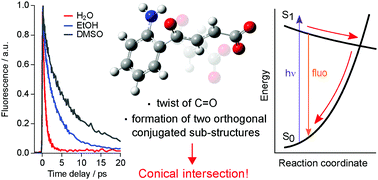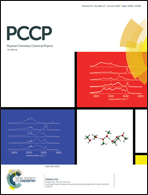Ultrafast excited state decay of natural UV filters: from intermolecular hydrogen bonds to a conical intersection†
Abstract
Kynurenines (KNs) are natural UV filters of the human eye lens, protecting the eye tissues from solar UV radiation. Key points of their effective protection are the intramolecular charge transfer (ICT) in the excited state and the fast dissipation of absorbed light energy into heat via the intermolecular H-bonds. Herein we report that the introduction of an unsaturated double bond in the amino acid side chain, operating as an ICT-enhancing electron donor group, drastically accelerates the internal conversion (IC) due to a conical intersection (CI) between the potential energy surfaces of the excited and ground states. Our photophysical study of a deaminated KN (carboxyketoalkene, CKA), an intrinsic product of KN thermal decomposition, demonstrates an unusually fast excited state decay in a broad range of solvents of different polarity and proticity. The detailed analysis of interactions in the excited state by different computational techniques revealed that the changes in molecular structure – the twist of the carbonyl group from the plane of the aromatic ring followed by the formation of two mutually orthogonal conjugated substructures – are responsible for the CI of the excited and ground state potential energy surfaces. Intermolecular H-bonds facilitate the transition to the CI, but do not play a crucial role in the fast decay of the excited state. An extremely fast and efficient IC in CKA opens the way for the design of new types of organic UV filters and their applications in material science, cosmetics and medicine.

- This article is part of the themed collection: 2018 PCCP HOT Articles


 Please wait while we load your content...
Please wait while we load your content...